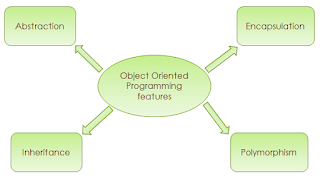Learn OOP’s Concepts in .NET
INTRODUCTION:
It is necessary for new programmers to know about OOPS concept before learning any programming language. This article helps to know about the OOPs in Dot Net. Object-oriented programming is very important when building complex applications. Dot NetFramework Supports only OOPS languages such as VB.net,c#. To effectively use .NET ,a developer must understand and apply object oriented concepts.
Check Here: Microsoft Dot Net Latest Updated Content(Free PDF)
OOPS CONCEPTS:
Object is representative of the class and is responsible for memory allocation of its data members and member functions.The set of activities that the object performs defines the object’s behavior.
Class:
Class is user defined data types.It is a collection of object.Class is the blueprint , plan, or template, that describes the details of an object. . Class does not occupies the memory
Abstraction:
Abstraction is defined as showing only the essential features to the user.Abstraction is a process of hiding the implementation details and displaying the essential features.
Encapsulation:
Encapsulation is a process of binding the data members and member functions into a single unit.In oops it prevents access to implementation details.The idea behind this concept is Don’t tell me how you do it. Just do it.
Inheritance:
One class can include the feature of another class process of deriving the new class from already existing class .In inheritance the main advantage is code reusability.
Polymorphism:
Polymorphism is ability to take more than one form. An operation may exhibit different in different situations.There are two types of Polymorphism.
Compile Time Polymorphism - compiler identifies which polymorphism form it has to take and execute at compile time.
Runtime Polymorphism - compiler identifies which polymorphism form it has to take and execute at runtime but not at compile time.
Check Here: ASP.NET MVC Latest Updated Content(Free PDF)
Check Here: Microsoft Dot Net Latest Updated Content(Free PDF)
OOPS CONCEPTS:
There are a few concepts that form the foundation of object-oriented programming:Objects
- Classes
- Abstraction
- Encapsulation
- Inheritance
- Polymorphism
Object is representative of the class and is responsible for memory allocation of its data members and member functions.The set of activities that the object performs defines the object’s behavior.
Class:
Class is user defined data types.It is a collection of object.Class is the blueprint , plan, or template, that describes the details of an object. . Class does not occupies the memory
Abstraction:
Abstraction is defined as showing only the essential features to the user.Abstraction is a process of hiding the implementation details and displaying the essential features.
Encapsulation:
Encapsulation is a process of binding the data members and member functions into a single unit.In oops it prevents access to implementation details.The idea behind this concept is Don’t tell me how you do it. Just do it.
Inheritance:
One class can include the feature of another class process of deriving the new class from already existing class .In inheritance the main advantage is code reusability.
Polymorphism:
Polymorphism is ability to take more than one form. An operation may exhibit different in different situations.There are two types of Polymorphism.
Compile Time Polymorphism - compiler identifies which polymorphism form it has to take and execute at compile time.
Runtime Polymorphism - compiler identifies which polymorphism form it has to take and execute at runtime but not at compile time.
Check Here: ASP.NET MVC Latest Updated Content(Free PDF)



Comments
Post a Comment